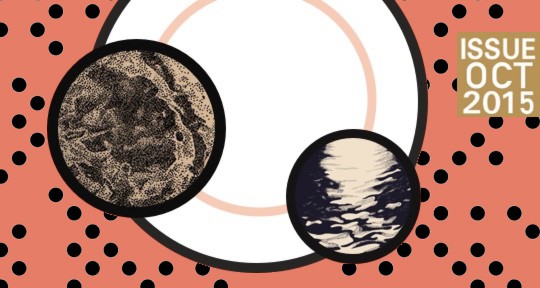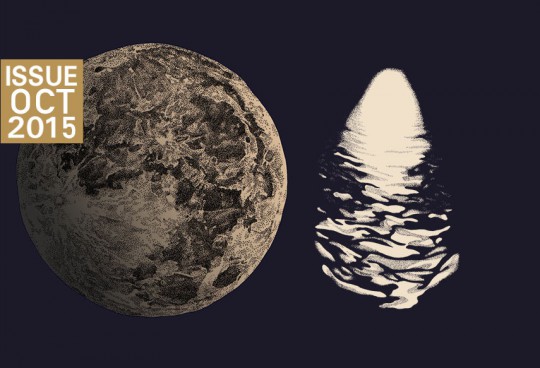The third quarter of 2015 is thorny with developments. On July 31, we announce the second edition of our international translation contest judged by Michael Hofmann (Poetry), Ottilie Mulzet (Fiction), and Margaret Jull Costa (Nonfiction—a new category), this time awarding a total of $4,500 in prizes. Technical Manager József Szabo (also one of the editors behind the fabulous Tumblr blog Writers No One Reads) completes a laborious site migration that has taken almost two years. Our website is now both adaptable to mobile devices and optimized for search engines. On October 1, I receive an invitation from The Guardian initiating a partnership that would see Asymptote simultaneously running our blog’s Translation Tuesday articles on their site for 76 weeks, starting from October 27. (Of the 11 Guardian Books Network Members announced on October 21, we are the only magazine dedicated to translation and also—I can’t help noting—the only one from Asia.) This turns out to be the first of three partnerships that we formalize in October (the other two being with PEN America and Lithub), all three of which we announce proudly via our first-ever Fortnightly Airmail, launched on October 29, thanks to then Communications Manager Matthew Phipps and then Graphic Designer Berny Tan (who valiantly turns around a new newsletter design within 24 hours after I veto the first). This inaugural newsletter doesn’t yet spotlight PEN/Heim grant winners (the first boatload of these would arrive on November 13). Instead, it carries Jennifer Croft’s essay “When the Author You Translate [i.e., Olga Tokarczuk] Gets Death Threats,” which Lithub republishes on their website on November 2. (We would also go on to be the first to excerpt Olga Tokarczuk’s 2018 International Man Booker Prizewinning Flights in our Winter 2016 edition before it hit bookstores anywhere.) October 2015 also ushers in our first-ever virtual event featuring Mexican author Albert Chimal’s “The Time-Traveller.” Originally composed in Spanish as a series of tweets, the English translation by George Henson, which also respects Twitter’s character limit of 140, is published twice: first, as a headliner in our Fall 2015 issue, and then via our English Twitter channel as a long string of tweets pushed out (by then Marketing Manager David Maclean) to the world over a span of 40 hours. If you were there for the tweetathon, thank you for being a part of the work. Here to introduce our Fall 2015 issue is Hong Kong editor-at-large Charlie Ng Chak Kwan.
If I were able to travel back to 2013 and meet my younger self, I would enthusiastically tell her that she was about to become part of a community devoted to breaking cultural and linguistic borders in the literary world and that she would never regret joining a journal whose mission was translating and publishing works written by people far and wide. It is unbelievable that I have now been a Hong Kong Editor-at-Large for Asymptote for more than five years. The many issues of Asymptote have seen me face a few life hurdles—graduating from my Ph.D., securing my first job as a translator, and becoming a full-time university teacher—and still I stay with Asymptote. Time definitely changes a lot of things—for good or for bad—but the ever-expanding archive of Asymptote tells me there are some things that remain constant, like the journal’s perseverance.
Time, the fourth dimension of our existence, threads through the whole Fall 2015 issue as its unifying motif. The issue’s pieces transport us to a wide range of times, from the Armenian genocide in Gostan Zarian’s “The Traveler and His Road” to the forensic anthropological investigation of the dead in Leila Guerriero’s “The Trace in the Bones”. We are not restricted by conventional time frames that confine our experience as words allow us to exist in the past, the present and the future simultaneously. The first line of Alberto Chimal’s “The Time Traveller” actually says it all: “Good morning, afternoon, evening, says the Time Traveller when his machine is moody and doesn’t ask him where (or to when) he’s going.” The Time Traveller’s trouble, in other words, is not where to go but rather the lack of a good temporal compass. Chimal’s story—comprised of a series of the Time Traveller’s wild and witty Tweets—portrays a compassionate titular character with ample knowledge of history and literature. Although its protagonist is no Gulliver—he is much more sophisticated than that 18th century traveller—Chimal’s story amuses and fascinates as much as Swift’s, even as it avoids the latter’s satiric bitterness.
Wild temporalities can also be found in Yasutaka Tsutsui’s “Descent into Yoppa Valley”. The story’s magical realist style not only captures an intriguing coexistence of human villagers and an imagined species of spiders; it also furnishes the narrative with a perplexing spatio-temporal dimension. As he searches for his wife, Akeme, who fell into the village’s valley and got caught among the spiders, the narrator breaks into the mysterious arachnids’ web and enters an extraordinary world. He finds his wife, but she has surprisingly reverted to a child’s body while maintaining the consciousness of her adult self. The dialogue between the narrator and Akeme mixes experiences from their common past with the language of society and governance. With the complexity of Akeme’s identity, the story’s connotations abound: it can be read as an allegory of the encounter of communities or species or as a mythical tale.
Besides exploring the imaginary possibilities of time, this issue is also well aware of actual historical time. Most notably, the Hong Kong poetry feature commemorated the the Umbrella Movement that had taken place place exactly one year before. I assisted our Senior Editor for Chinese, Chenxin Jiang, with the curation of the feature by introducing a few poems that were originally published in Chinese in Zihua (Fleurs des Lettres, our journal partner in Hong Kong) and the Umbrella Movement poetry collection of Sound & Rhyme Bi-monthly Poetry Magazine. This collection was not for sale, and the number of copies was limited. It is a rare document of the creative literary energy ignited by the society-wide movement that brought social conception of Hong Kong identity to a new ground.
Lok Fung’s “October in the City: A Book of Amnesia” forcefully presents a series of images that captures the sickness and violence in a suffering city. The moving crowd in the poem reminds us of the Londoners in T. S. Eliot’s “The Waste Land”, but those in Lok Fung’s crowd are hardly alienated or unconscious beings.Instead, they are autonomous, awakened citizens: “When the sick city lies down and becomes an occupied stone / the canals of the body stir the consciousness awake/the unlit sky draws clumps of clouds / pushing the people below toward raised banners and posters”. Eleanor Goodman’s English translation faithfully transports the richness of the poem’s meanings without losing either the momentum or dramatic quality of the original.
Yet what can make this group of poems challenging for translation is their local spirit. Although it is impossible for the use of Cantonese in Lau Yee-ching’s original Chinese version of “United in Silent Self-Cultivation” to be perceptible in the English translation, Nicholas Wong’s translation of Eric Lui’s “Taking the Spaceship Back” and Sophie Smith’s translation of Chung Kwok Keung’s “from Occupy Stories” preserve the localness well with the vivid representations of urban space. In “Taking the Spaceship Back”, the city at 3 a.m. is sleepless:
there’s a faint beating of the drum from afar
who is rattling the night?
At 3 a.m. the TV is on, a snowy screen of static
long asleep while waiting
dreaming that you’ll come back in a spaceship
and land on the piano, making a wave of noise
a neighbor slams his door, waking you up
At 3 a.m. lights on the highway back away hastily
the pleasure of secretly leaning against a minibus window
until the bus makes a sudden turn and pitches you out
the city is seventy degrees inverted
a blur of smiling facing
The whole poem centres on the hustle and bustle of a restless night in which a work-bound urbanite sacrifices sleep for some space travel and a panoramic visit across the city. The poetic voice is unmistakably a local one: the density of sounds is typical of a highly populated metropolis, and riding the galloping minibus in early morning is well-known among Hongkongers as a bet on life. Chung Kwok Keung’s agricultural and natural images in his three poems also remind us that the city is not completely severed from nature. To put it another way: the city’s people still maintain a faith in the law of nature—sowing, growing and blossoming—despite the ruthless uprooting by authorities.
The topics of time travelling and historical representation are appealing, but we are most familiar with the everyday passing of time. The warmth we feel when reading Chen Li’s autobiographical writing in “Two Lyric Essays” may just confirm that our sense of time essentially comes from our memories. The details of our quotidian life always remain, shimmering in the depths of our mind and heart.
Charlie Ng Chak-Kwan has been a Hong Kong editor-at-large at Asymptote since March 2013.
*****
Read more from our #30issues30days showcase:


